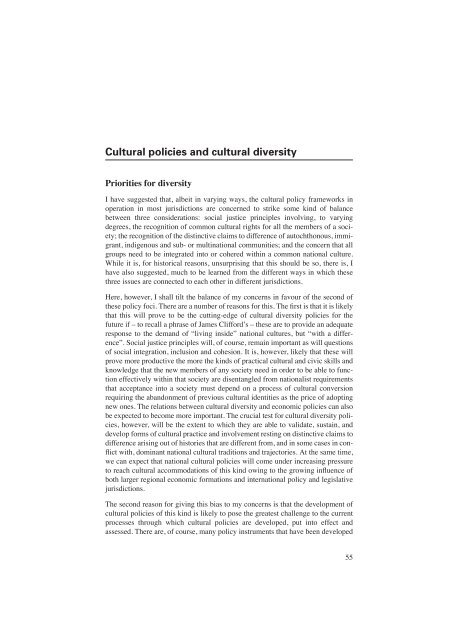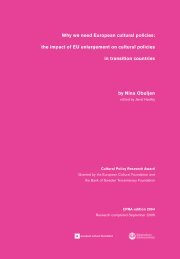Tony Bennett, Differing diversities - Council of Europe
Tony Bennett, Differing diversities - Council of Europe
Tony Bennett, Differing diversities - Council of Europe
You also want an ePaper? Increase the reach of your titles
YUMPU automatically turns print PDFs into web optimized ePapers that Google loves.
Cultural policies and cultural diversityPriorities for diversityI have suggested that, albeit in varying ways, the cultural policy frameworks inoperation in most jurisdictions are concerned to strike some kind <strong>of</strong> balancebetween three considerations: social justice principles involving, to varyingdegrees, the recognition <strong>of</strong> common cultural rights for all the members <strong>of</strong> a society;the recognition <strong>of</strong> the distinctive claims to difference <strong>of</strong> autochthonous, immigrant,indigenous and sub- or multinational communities; and the concern that allgroups need to be integrated into or cohered within a common national culture.While it is, for historical reasons, unsurprising that this should be so, there is, Ihave also suggested, much to be learned from the different ways in which thesethree issues are connected to each other in different jurisdictions.Here, however, I shall tilt the balance <strong>of</strong> my concerns in favour <strong>of</strong> the second <strong>of</strong>these policy foci. There are a number <strong>of</strong> reasons for this. The first is that it is likelythat this will prove to be the cutting-edge <strong>of</strong> cultural diversity policies for thefuture if – to recall a phrase <strong>of</strong> James Clifford’s – these are to provide an adequateresponse to the demand <strong>of</strong> “living inside” national cultures, but “with a difference”.Social justice principles will, <strong>of</strong> course, remain important as will questions<strong>of</strong> social integration, inclusion and cohesion. It is, however, likely that these willprove more productive the more the kinds <strong>of</strong> practical cultural and civic skills andknowledge that the new members <strong>of</strong> any society need in order to be able to functioneffectively within that society are disentangled from nationalist requirementsthat acceptance into a society must depend on a process <strong>of</strong> cultural conversionrequiring the abandonment <strong>of</strong> previous cultural identities as the price <strong>of</strong> adoptingnew ones. The relations between cultural diversity and economic policies can alsobe expected to become more important. The crucial test for cultural diversity policies,however, will be the extent to which they are able to validate, sustain, anddevelop forms <strong>of</strong> cultural practice and involvement resting on distinctive claims todifference arising out <strong>of</strong> histories that are different from, and in some cases in conflictwith, dominant national cultural traditions and trajectories. At the same time,we can expect that national cultural policies will come under increasing pressureto reach cultural accommodations <strong>of</strong> this kind owing to the growing influence <strong>of</strong>both larger regional economic formations and international policy and legislativejurisdictions.The second reason for giving this bias to my concerns is that the development <strong>of</strong>cultural policies <strong>of</strong> this kind is likely to pose the greatest challenge to the currentprocesses through which cultural policies are developed, put into effect andassessed. There are, <strong>of</strong> course, many policy instruments that have been developed55














